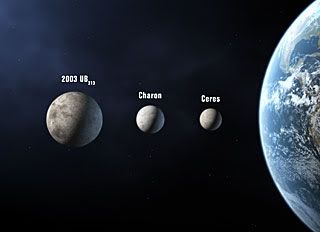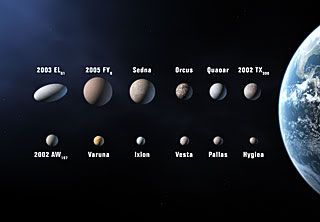The IAU is going to be voting on the draft definition of a planet on August 24th:
(1) A planet is a celestial body that (a) has sufficient mass for its self-gravity to overcome rigid body forces so that it assumes a hydrostatic equilibrium (nearly round) shape, and (b) is in orbit around a star, and is neither a star nor a satellite of a planet.There may be many more planets other than Mercury, Venus, Earth, Mars, Ceres, Jupiter, Saturn, Uranus, Neptune, Pluto, Charon, and 2003UB313 (aka Xena).
(2) We distinguish between the eight classical planets discovered before 1900, which move in nearly circular orbits close to the ecliptic plane, and other planetary objects in orbit around the Sun. All of these other objects are smaller than Mercury. We recognize that Ceres is a planet by the above scientific definition. For historical reasons, one may choose to distinguish Ceres from the classical planets by referring to it as a "dwarf planet."
(3) We recognize Pluto to be a planet by the above scientific definition, as are one or more recently discovered large Trans-Neptunian Objects. In contrast to the classical planets, these objects typically have highly inclined orbits with large eccentricities and orbital periods in excess of 200 years. We designate this category of planetary objects, of which Pluto is the prototype, as a new class that we call "plutons".
(4) All non-planet objects orbiting the Sun shall be referred to collectively as "Small Solar System Bodies".

Under this proposed definition, the asteroids Pallas, Vesta, and Hygeia might also be planets, depending on whether they are pulled into spherical shapes by gravity. Furthermore, the trans-Neptunian and Kuiper belt objects Ixion, Quaoar, Varuna, 2003EL61 (Santa), 2005FY9 (Easterbunny), Orcus, 2002TX300, 2002AW197 and Sedna might also be planets under this new definition, pending observation.

I think that there are some other possible planets besides those pictured above, such as 2004XR190 (Buffy). From Space.com:
"It's flattering to be considered discoverer of the 12th planet," Brown said in a telephone interview. He applauded the committee's efforts but said the overall proposal is "a complete mess." By his count, the definition means there are already 53 known planets in our solar system with countless more to be discovered.More from Phil Plait, Centauri Dreams, Dave Pearson (twice), Fred Kiesche, Barry Johnson, Paul Anderson, Jesse at Space Law Probe, Kara at Space Tramp, the Spacewriter, Tales of the Heliosphere, Tom Dumont, Mark Whittington, and Ian Musgrave.
Update: more from Jay Manifold, Astroprof, and SCSU Astronomy.
Technorati Tags: Space, Planet
2 comments:
You're right, that was good. Thanks for the links too.
lol i love it...they have to state that satellites arent planets..but i guess someone could "Somehow" confuse it with a Satellite galaxy.
great article!
p.s. how can Pluto not be a planet and they're considering it's moons for being planets lol
Post a Comment